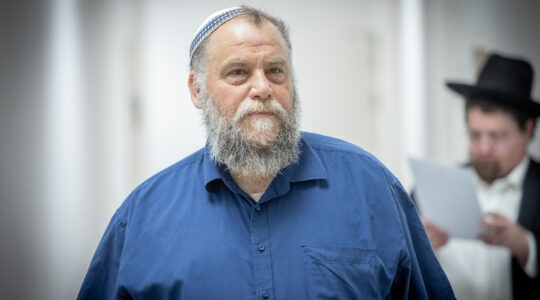NEW YORK (JTA) – A landmark statement by leading Muslims intellectuals calling for Jewish-Muslim dialogue has won broad support from Jewish leaders, even as some elements and some signatories were deemed problematic.
The statement, released last week and titled “A Call to Peace, Dialogue and Understanding Between Muslims and Jews,” was facilitated by scholars at the Centre for the Study of Muslim-Jewish Relations at the University of Cambridge in England.
Unlike earlier efforts at dialogue, which often have sought to discourage discussion of the Israeli-Palestinian conflict, the statement openly acknowledges the conflict’s centrality to Jewish-Muslim tension.
The letter, addressed to “rabbinic leaders and the wider Jewish communities of the world,” calls for a solution that provides “mutual respect, prosperity, and security” to both sides, while providing for Palestinian self-determination.”
“Most Muslims would hope that the sufferings Jews have experienced over many centuries would make them more sensitive to the sufferings of others, especially the Palestinian people,” the letter said.
No signatories were included with the text of the letter available on the Centre’s Web site, but according to other news reports they reportedly include leading Muslim figures from around the world. Among them are the grand mufti of Bosnia; Sheik Suhaib Hasan, one of Britain’s top Islamic scholars; and Sari Nusseibeh, the president of Al Quds University in Jerusalem.
Most Jewish leaders welcomed the statement as a promising sign of enhanced dialogue between Muslims and Jews. An adviser to British Chief Rabbi Jonathan Sacks called it an “enlightened document,” according to the London Jewish Chronicle.
Leaders of the Reform, Conservative and Reconstructionist movements in the United States also welcomed the letter, notably its call for a “peaceful resolution” of the Israeli-Palestinian conflict.
The International Jewish Committee for Interreligious Consultations, the representative body of world Jewry for interfaith dialogue, issued its own letter in response and echoing the call to dialogue.
“We cannot afford to spurn the hand of Muslim moderation,” said Rabbi David Rosen, the committee chair. “The Jewish people have a critical, existential interest in advancing Jewish-Muslim dialogue.”
Though Rosen acknowledged that parts of the letter were “not entirely satisfactory,” in particular its failure to acknowledge Arab responsibility for the conflict, he nevertheless believes it would be harmful to Jewish interests not to respond positively.
Also of concern was one of the signatories, Tariq Ramadan, a controversial Swiss scholar who was denied a visa by the U.S. government to teach at the University of Notre Dame in Indiana.
More recently, Ramadan called for a boycott of the Turin International Book Fair because organizers decided to focus on Israeli writers in honor of the Jewish state’s 60th anniversary.
Ramadan “has a history of troubling statements and indeed he has said some troubling things about me personally,” said Daniel Pipes, the director of the Philadelphia-based Middle East Forum. “I think this is someone on the other side of the war on terror and should not be allowed to participate in mainstream life, as his exclusion from the United States has in part done.”
The controversy over Ramadan underscores the difficulty Jewish leaders have encountered in their efforts to foster dialogue with the Muslim community, especially the challenge of identifying so-called Muslim moderates to serve as interlocutors.
Two years ago, an interfaith meeting hosted by Rabbi Marc Schneier of New York was nearly derailed when Imam Omar Abu-Namous, the head of the Islamic Cultural Center of New York, unleashed a barrage of criticism of Israel, calling for a binational state of Arabs and Jews to replace Israel and denying the historical record of Arab belligerence against the Jewish state.
Undeterred, Schneier and Abu Namous tried again, organizing a second meeting where they agreed to take the Israeli-Palestinian conflict off the table. The same rule applied to a November summit meeting of rabbis and imams, also organized by Schneier, the president of the Foundation for Ethnic Understanding.
“There are some very significant Islamic leaders that have signed on to this and have expressed their heartfelt desire to engage in dialogue with the Jewish community,” Schneier said of last week’s statement. “It’s a very, very exciting opportunity.”
Schneier acknowledged that Ramadan’s participation had given him “pause.”
The letter describes tensions between Muslims and Jews as more a function of ignorance and misunderstanding than any innate animus between the two communities. Several Koranic verses are cited to demonstrate Islam’s respectful attitude toward Jews, and several theological affinities between Judaism and Islam are noted.
“There was a need to provide a very clear statement by the Muslims to the Jews on the various matters addressed in the letter and to create an awareness in Muslims that they can have, and continue to have, a positive stance and inclusivistic approach to its relations with Jews,” Sheik Michael Mumisa, a lecturer at the Centre for Muslim-Jewish Relations, told JTA.
Still, the statement drew criticism, and not only for Ramadan’s role.
Writing last week in the London Jewish Chronicle, Mehri Niknam, an Iranian-born Jew and executive director of the British-based Joseph Interfaith Foundation, called the letter “naive and condescending,” and questioned its scholarly credentials.
“To assume that the problems of Muslim-Jewish relations worldwide can be resolved simply because we all worship a Unity, give charity and eat kosher and halal food,” Niknam wrote, “is intellectually offensive equally to both sides.”





